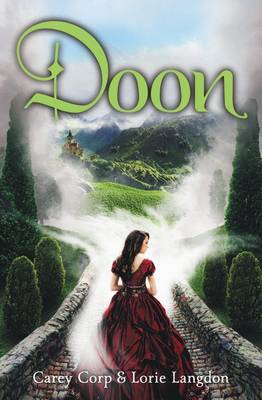Reviewed by Briana @ Pages Unbound on
A romantic fantasy set half in Scotland and half in a magical world that can only be accessed once every hundred years, Doon has a lot going for it. The setting is appealing and the premise intriguing. Throw in the cute guys, and the book just gets more marketable. Unfortunately, most of this appeal is obscured by the fact that the prose is terrible and the novel clearly needed a lot more editing before it shelves. Doon certainly presents its readers with a myriad of hurdles before allowing them to buckle down and attempt to enjoy the world and the plot.
“Bad prose” is, of course, a subjective phrase, and one that can refer to a number of different problems; however, Doon seems to have them all. In the first place, there is a noticeable amount of incorrect grammar, which is sure to grate on the nerves of many readers (who, you know, tend to be people who appreciate the English language). This could potentially be attributed to the fact that the book is in first person; maybe the protagonists speak with bad grammar. That’s realistic, right? Unfortunately, the argument that this is an intentional artistic decision gets a lot harder to make when one realizes that the author biographies on the book jacket also have bad grammar. This is clearly a problem that originated with the authors and/or editor.
Unfortunately, the copy editor responsible for this book also dropped the ball on consistency issues. It is difficult to take a book seriously when it seems to have no idea what is happening, and to have no memory of what it just stated. For example: Fairly early in the story the protagonists go on a carriage ride with a few other characters. They make a huge deal out of the fact that one of the characters is weirdly dressed. He’s all in black. He has a dramatic cloak. The hood is pulled over his eyes. He looks depressed. He looks like the Grim Reaper. He looks like a Star Wars Jedi. Whatever. These girls cannot stop thinking about how odd and out of place this guy looks in his all-black ensemble. Yet, just pages later, one of the girl doesn’t recognize him. That just doesn’t make sense.
Finally, the prose has one issue that is much harder to fix than grammar mistakes or story consistency: It features what I like to call “teen-speak as imagined by adults.” Sure, there are some teens who use copious amounts of slang. However, it is very difficult to write such teenage voices realistically. Doon is a case that fails. Personally, I found both of the characters’ dialogue incredibly annoying and incredibly fake. Reading about people who even think in slang and weird metaphors (ex. Worrying that someone will think they’re “cuckoo for Cocoa Puffs”) is just not enjoyable for me. There are also a lot of references (like Veronica and Mackenna calling each other “the girl who shares my brain”) that read as if they originated as inside jokes from the authors’ own friendship, and they don’t translate well to the novel.
Even beyond the dialogue, I have to admit I did not much care for the characters. This is certainly a personal reaction I don’t expect to extend to all readers. However, Veronica seems like the disagreeable popular cheerleader who ends up as the stereotypical villain in a lot of books. And while I appreciate the authors’ attempt to do something un-stereotypical with the character mold, I still didn’t like her. I also found her complete willingness to believe in and trust in magic unrealistic. She does have a backstory designed to explain why she would want to find escapism in magic, but wanting to believe in magic and actually believing it are two different things. Mackenna is perhaps more realistic on this account (aka more skeptical), but I didn’t like her much better. Her characterization is really a fixation on a single goal, which isn’t particularly interesting, and is often out of place. Singing show tunes cannot solve all your problems (however much I wish it could).
That said, Doon really does succeed as a romance, and it knows it. With all the references to the smoldering hot, ridiculously buff guy in a kilt, it is clearly attempting to evoke something of the steamy period romance novel genre—just a version watered down enough that it can be marketed to teens. So while the book may have a sincere interest in magic and Brigadoon, it is clear that its primary interest is in creating a hot Scottish fantasy. To that end, it actually gives readers two hot guys: one who is the epitome of chivalry and good humor, and one who has wild mood swings but can probably be forced into admitting he is in love. Readers who do not like one guy have a fallback option; they can swoon over the other.
And, yeah, I kind of fell for it. I liked the romantic tension, and I thought parts of the book were really cute. I’m certainly not interested in the sequel to this book for its writing, its world building, or its plot, but if I’m ever in the mood for a fluffy romantic read, I know where to look, and I’d be willing to give it a chance. For that, I gave this book 3 out of 5 stars.
Reading updates
- Started reading
- 24 January, 2015: Finished reading
- 24 January, 2015: Reviewed
